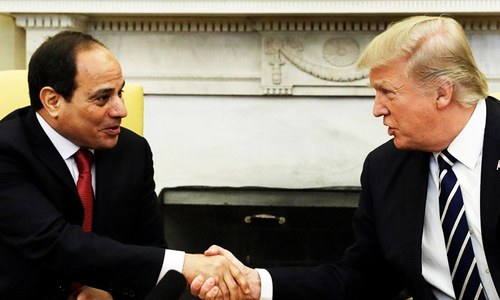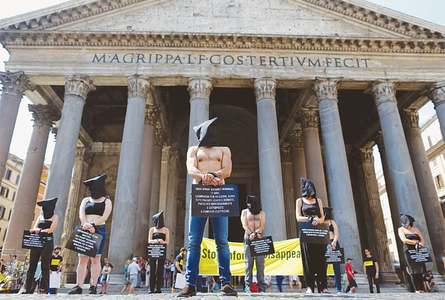
The Islamic State group claimed responsibility for bombing two Egyptian churches as worshippers gathered to mark Palm Sunday, killing at least 43 people in the deadliest attacks on the Coptic Christian minority in recent memory.
The attacks followed a Cairo church bombing in December and came weeks before a planned visit by Catholic Pope Francis intended to show support for Egypt's Christian minority.
The first bombing struck the Mar Girgis church in the city of Tanta north of Cairo, killing 27 people, the health ministry said.
The second, carried out just a few hours later by a suicide bomber in Alexandria, hit the historic seat of the Coptic Pope, killing 11, including three police officers, and injuring 35, the ministry added.
IS claimed its “squads” carried out both attacks, in a statement by its self-styled Amaq news agency published on social media.
Pope Tawadros, who had attended mass at Saint Mark's Cathedral, was still in the building at the time of the explosion but was not harmed, the Ministry of Interior said.
The bombings come as the militant Islamic State (IS) group's branch in Egypt appears to be stepping up attacks and threats against Christians.
The attacks are the latest in a series of assaults on Egypt's Christian minority, which makes up around 10 percent of the population and has been repeatedly targeted by militants.
Palm Sunday is one of the holiest days of the Christian calendar, marking the triumphant entrance of Jesus to Jerusalem.
CBC TV showed footage from inside the church in Tanta, where a large number of people gathered around what appeared to be lifeless, bloody bodies covered with papers.

Provincial governor Ahmad Deif told the channel that at least 42 people were wounded in the first attack and that the explosion occurred inside the church.
“Either a bomb was planted or someone blew himself up,” Deif said, adding that security forces had searched the church and surrounding areas for additional explosive devices.
Copts, who make up about one tenth of Egypt's population of more than 92 million and who celebrate Easter next weekend, have been targeted by several attacks in recent months.
Militants accuse them of supporting the military overthrow of former president Mohamed Morsi in 2013, which ushered in a deadly crackdown on his supporters.
In December, a suicide bombing claimed by IS killed 29 worshippers during Sunday mass in Cairo.
The bombing of the church within a compound that also holds the seat of the Coptic papacy was the deadliest attack against the minority in recent memory.
A spate of militant attacks in Egypt's restive Sinai Peninsula, including the murder of a Copt in the city of El Arish whose house was also burned, have led some Coptic families to flee their homes.

About 250 Christians took refuge in the Suez Canal city of Ismailiya after IS released a video in February calling for attacks on the religious minority.
Egypt's army is waging a counter-insurgency against an IS affiliate in Sinai, which has claimed scores of attacks against police and army positions.
President Abdel Fattah al-Sisi, who as army chief helped the military to remove Morsi, defended his security forces in a televised address soon afterwards.
“(The attacks aim to) destabilise the fabric of Egypt... to give the impression that one group isn't protected as it should be,” Sisi said at the time.
Following Morsi's ouster, mobs attacked dozens of churches and Christian properties.
Pope Francis is due to visit Cairo on April 28-29 to show solidarity with Egypt's Christian community.
The pontiff will visit the site of the December church attack next to Saint Mark's Coptic Orthodox Cathedral ─ the seat of Coptic Christian Pope Tawadros II.
'We feel targeted'
A shift in IS group's tactics, which has waged a low-level conflict for years in the Sinai peninsula against soldiers and police, to targeting Christian civilians and broadening its reach into Egypt's mainland is a potential turning point in a country trying to prevent a provincial insurgency from spiralling into wider sectarian bloodshed.
Egypt's Christian community has felt increasingly insecure since IS spread through Iraq and Syria in 2014, ruthlessly targeting religious minorities. In 2015, 21 Egyptian Christians working in Libya were killed by IS.
“Of course we feel targeted, there was a bomb here about a week ago but it was dismantled. There's no security,” said another Christian woman in Tanta referring to an attack earlier this month near a police training centre that killed one policeman and injured 15.
Copts face regular attacks by Muslim neighbours, who burn their homes and churches in poor rural areas, usually in anger over an inter-faith romance or the construction of a church.











































